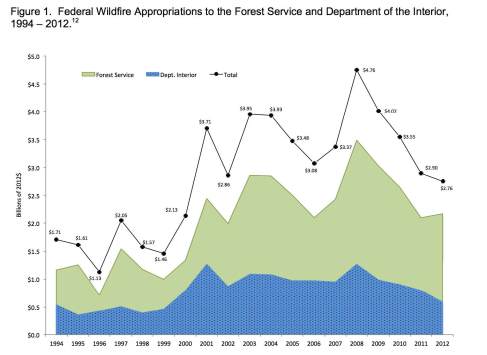My heart goes out to the victims of the recent Black Forest fire in Colorado, and to the hundreds that have lost their homes in this horrible event. This fire season is certainly keeping with the trend of longer, more intense, and more destructive and expensive wildfire seasons; my fear, and the prediction of climate scientists, is that its bound to get worse.
Fire is a natural and very important component of healthy forests. Many species of plants depend on fire as a component of their life cycle. Forest fires help create heterogeneity, setting the stage for patch diversity and all kinds of ecological processes we have come to recognize as important, indeed essential for healthy forests and grasslands.
Some of our conflict with forest fires are of our own making: when we build houses in relatively remote areas that are subject to wildfires, it shouldnt be too surprising that can be a risky choice that could end up in loss. And certainly, US Forest Policy throughout much of the 20th century didnt help either, as we are finally, mostly emerging from a very long period of suppressing forest fires, which has led over the past century to a dangerous build-up of forest fuels, making fires more likely to happen and more severe when they do occur.
But climate change is adding a lot more fuel to those fires. The predicted changes in weather in the intermountain west and in many other areas of Europe, Australia, and other temperate and subtropical areas of the globe include earlier and longer summers, more intense heat, drier conditions, and increased lightening as a result of increased storm activity. In addition, increases in forest pests and diseases, such as the mountain pine beetle which has devastated western forests and has become increasingly productive with rising air temperatures, are also contributing to higher forest fuel loads. These changes are tipping the balance of forest fire and creating feedback loops where higher temperatures and disease incidence -> more forest fuels -> more intensive and destructive fires -> less carbon stored, more carbon released, further contributing to the climate change that is fueling this cycle.
If you are not sufficiently disturbed by the number of ecosystem services that we are losing to catastrophic wildfire, including carbon storage, forest habitat, soil retention, and many other products of intact forests , the economic argument should help. So far Colorado’s governor has allocated more than $10 million to fighting the Black Forest fire; you can be sure this will not be the limit of funds that will be devoted, and the insurance costs for replacing 400 homes will not come cheap. We are outpacing our state allocations for wildfires: for example, in 2012 Utah spent $50 million fighting wildfires for which the state had allocated $3 million; while the state ultimately had to come up with another $13 million, the balance fell on the federal government; as you can see from the figure below, we are already up into the billions for federal funds allocated to wildfire protection, and the trajectory is certainly a positive one. This year, as you can well imagine, the sequester is not going to make it easy for congress to allocate money towards the difficult wildfire season this is already shaping up to be.
So this is one of those moments where I really just want to go “what the hell can I possibly do? Its too big a problem for anyone to solve! I’m not about to go don my nomex and fight a wildfire (yes, I used to do that, when I was 22 and thought I was invincible- not anymore!). But I think the rising economic and ecological costs should REALLY make us pause and reflect that we are seeing the real damage, right here and now, as translated through the lens of climate change- or, frighteningly, a small preview of what is to come. Yes, there are many complex factors at work here that contribute to the escalating costs and the escalating destruction of our wildfire season. But climate change sure as hell is not helping. So what can I, what can all of us do? Well, most of the previous 67 actions described here are important. If you live in fire-prone areas, taking every precaution you can not to contribute to wildfires is critically important (yes, Smokey the Bear still has a point). At the same time, we as a society need to recognize there is a very beneficial and important role for controlled burns, so that we can keep fuel loads down and reduce the risk of the catastrophic fires which are becoming an increasingly common component of our landscape.
At a broad level, all of us can help by calling our representatives and demanding action on climate policy, and an end to the sequester- because allocating money for fighting fires to save people’s lives, among the other myriad of social and emergency services we are losing, is probably a bit more important than the pathetic steps congress has taken so far to piece off flight delays and other politically popular topics.
The issue of forest fires is one that I think we can view through the same lens as we view healthcare. In the same way that spiraling cases in health care costs are something that we can, and should, get under control by addressing the underlying causes of the costs. In the same way, we need to recognize that the costs we are paying for fighting forest fires are not trivial, are on the rise, and are likely to get out of control very quickly if we do not recognize and attack the root causes of the problem, including poor planning at the urban-wild interface; suppression and fuel load increases; and, most certainly, climate change.
